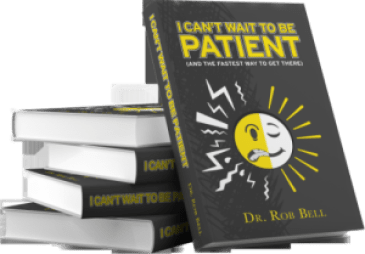Rob Bell's Blog, page 4
February 28, 2024
Worried About Children’s Physical Distancing and Mental Health? Check the L.A.B
Examining exactly how physical distancing affects a child’s mental health is a tricky endeavour. First, keep in mind that every child is different - while the changes brought about by the need for physical distancing are likely to produce a degree of anxiety in almost anyone, how severely it affects your child will vary.
Another difficulty is the lack of studies available related to intentional, prolonged, physical distancing (sometimes called social distancing). While we have studies about the mental health effects of isolation, the use of long-term physical distancing as a tool to stop the spread of disease has never been studied. In light of this, the best way to evaluate its mental health effects on children may be to look at related studies.
Many of the topics we’ll discuss here can affect adults, as well. When evaluating the mental health of a child or teenager, keep in mind that they may not have the language or emotional experience to properly express their feelings to you. You may have to do a bit of detective work as well as be open to difficult conversations.
The acronym L.A.B refers to the three biggest drawbacks to physical distancing: loneliness, anxiety, and boredom. We’ll go over a number of techniques to help alleviate these feelings in your child while they’re being asked to be physically distant due to illness.
Loneliness
One of the biggest obstacles during periods of physical distancing is loneliness. Children may find this especially hard as they’re often surrounded by their peers at school and during after school activities. This is a good time to work on your relationship as a family - walk together, talk together, and spend valuable time getting to know each other.
There is some evidence that it’s easier to bond with others through audio and video communication, rather than texting. This may mean that your children will feel less lonely if they communicate through Skype/FaceTime or via phone call than if they were to communicate over text exclusively. Your child is feeling lonely? Encourage them to phone their friends.
At the top, we briefly discussed that communicating feelings may be more difficult for children. Fortunately, this isn’t typically the case with loneliness. If you ask your child if they're feeling lonely, they should be able to express themselves with no problems. Though you can’t arrange for playdates, you can coordinate with parents to arrange for group phone calls or video chats. Encourage older children to do the same. Playing games online together can also be bonding.
Anxiety
Children are often in a position where they feel they have little control, from having to do what adults tell them to lacking the tools necessary for projects they’d like to undertake. With physical distancing, there’s an even greater removal of agency - not only are they not allowed to make rules for themselves, they can’t even do the things that used to be in their power, like seeing their friends and choosing their extracurricular activities.
One of the consequences of becoming sick and being asked to physically distance ourselves is that our normal routines have been wrested away from us - one of the many things that lie outside of our control. One of the benefits of routine is that it gives us a sense of control, no matter how old we are - by simply following our routine, we are accomplishing something. We have agency over something. Locus of control, the feeling that you have control over your life, is one of the keys to good mental health.
Children and teens will, inevitably, see substantial changes to their routines as a result of physical distancing. They don’t need to be up on time to catch the bus, they don’t go to school where classes are rigidly structured, they don’t have sports or clubs once school is over. The resulting feeling can be disorienting; routines give us a sense of place in time.
When your child is feeling listless, bored, or acting chaotic, it may be good to encourage them to create a routine. Do so in tandem with your child, helping them choose when to schedule certain activities. Make sure their routine involves mentally, physically, and spiritually stimulating activities. Work hard to maintain your own routine as well; as we know, children emulate their parents.
Alleviating anxiety is tricky, especially when everyone seems to be feeling it to some degree. Have honest conversations with your child about their feelings. Put extra effort into ensuring they have some degree of control over their lives. You may ask for their input on what to make for supper, and help them learn how to cook. You may ask them what chores they want to do, and give them responsibility over those chores. The more that your child feels they have power over their own lives, the less anxiety they might experience.
Boredom
You may be hard-pressed to find a group of kids who will tell you they love going to school. Nevertheless, you’re unlikely to find a group of kids who are all perpetually bored at school - they’ll enjoy gym class, or science, or talking with their friends. Throw in after school activities, and children often won’t have the time to be bored; their schedules are just too packed.
That’s all changed when you’re practising physical distancing. Boredom isn’t necessarily bad for your mental health; it can stimulate you to find a new hobby or do something creative. Perpetual boredom, on the other hand, can be a problem.
Fortunately, there are still plenty of things you can do while staying while physical distancing guidelines. Have a backyard? Set up a couple of impromptu soccer nets and play. A little less space? Look up some YouTube videos of activities you and your kids can do by using body weight. Yoga, gymnastics, kung fu - the number of tutorials you can find online to relieve boredom is astounding.
Looking for something more mentally stimulating? Pick up some board games to play with your kids. Encourage them to learn to draw, write poetry, or play an instrument. These activities can serve a dual purpose - alleviating boredom while providing creative and social outlets.
Authors Bio:
Veronica Wallace is a childhood educator and blogging enthusiast. Some of her favourite articles can be found on the Kidthink website. Kidthink specializes in offering clinical treatment of mental illness in children aged twelve and under, along with community outreach and training for this type of treatment.
The post Worried About Children’s Physical Distancing and Mental Health? Check the L.A.B appeared first on Mental Toughness Coach | Dr. Rob Bell - Speaker & Author.
What Mindset Is Best To Beat Post-Traumatic Stress?

What Mindset Is Best To Beat Post-Traumatic Stress?
Consider the pandemic as a trauma that we've all had to endure. Some of us, of course, have had it worse than others.
This trauma not a singular event that occurred, like a crash or a service member returning from deployment. But, it has had an impact.
Life stress doesn't have to be diagnosed, but consider the questions:
Has the quarantine been distressing or disturbing?
Have you felt edging and irritable?
Did Co-Vid19 cause you to feel anxiety or down?
We already have a growing anxiety concern because of our expectations and demands in life. And now we've added a huge life stressor with the pandemic. So, you have my permission to look at this experience as a society as a traumatic event.
When we understand what's occurred and how our mind wants to react, it can allow for recovery to take place. It doesn't mean we have a get out of jail free card, we need to accept it and get better from this, not stay bitter.
So what sort of mindset do we need to actively work on to overcome the traumatic stress?
My podcast episode with Dr. Bhrett McCabe shared some enlightening thoughts. We spoke about being at least a 6 month lag of mental health issues as a society. We spoke about confidence and knowing we were going to make it through, but then we touched on the most important mental skill.
What mindset we need is to stay flexible!
Flexibility allows us to bend without breaking. Boxer Jake LaMotta said, "You have to move WITH the punch."
Click To Tweet
Flexibility allows us to bend without breaking. Boxer Jake LaMotta said, "You have to move WITH the punch."
We have to adapt and overcome.
We have to make adjustments.
We are going to Puke & Rally.
We are always evolving and always changing , but the problem is the unknown and speculation is the mother of all evil. It's as simple as being able to constantly take a step back and examine how do I need to adapt and what mindset is keeping me rigid and stiff? Am I too caught up in events that don't really concern me? Have I allowed others to negatively change my mindset? Am I on social networking too much?
But, truthfully, I'm not flexible!
I crave for routine and structure. I like control over my health, life and how I "get after it." I don't like people cutting me off in traffic, or running stop signs. I often react poorly when simple things don't work like they should.
The post What Mindset Is Best To Beat Post-Traumatic Stress? appeared first on Mental Toughness Coach | Dr. Rob Bell - Speaker & Author.
January 30, 2024
5 Reasons The Importance of Time and Patience Can Improve Your Mental Toughness
Time is powerful.
Think of the importance of timing in life. It takes one moment, encounter, or meeting with someone to change the trajectory of lives. That’s the importance of the hinge. Timing is often about being in the right place at the right time and taking full advantage of opportunities.
Time is universal and the only non-renewable resource that is the same for everyone. We can earn more money, make new friendships, opportunities, or experiences, whereas no one can create any more time.
Time remains a constant. Regardless of the many changes that take place in society and how we operate and whatever technological advances we use to advance our mental toughness.
We must first appreciate and understand our relationship with time in order to develop patience.

#1- This Too Shall Pass
#2- Supply & Demand
#3- Rhythm > Speed
#4- Urgency & Patience
#5- Process > Product
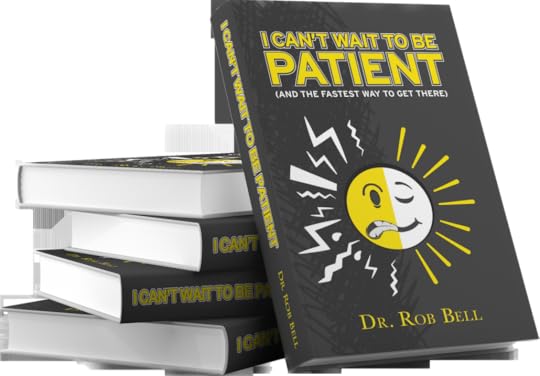
Read The New Mental Toughness Book:I Can’t Wait To Be Patient
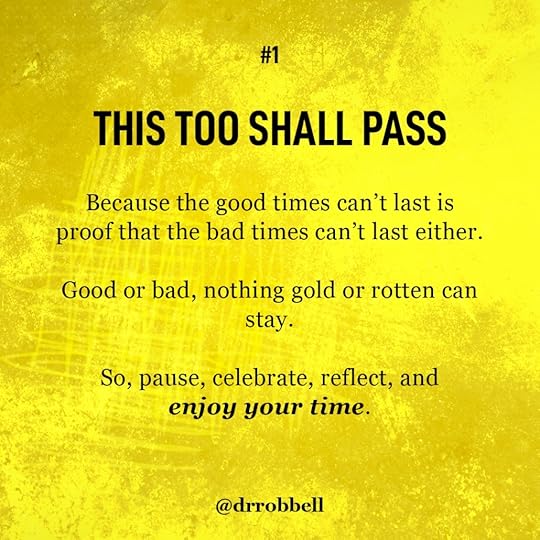
#1- This Too Shall Pass
Because the good times can’t last serves as proof that the bad times can’t last either.
Good or bad, nothing gold or rotten can stay. No matter how good the feeling, it can’t last. Time is the most powerful resource.
That’s the importance of patience.
So, pause, celebrate, reflect, and enjoy your time.
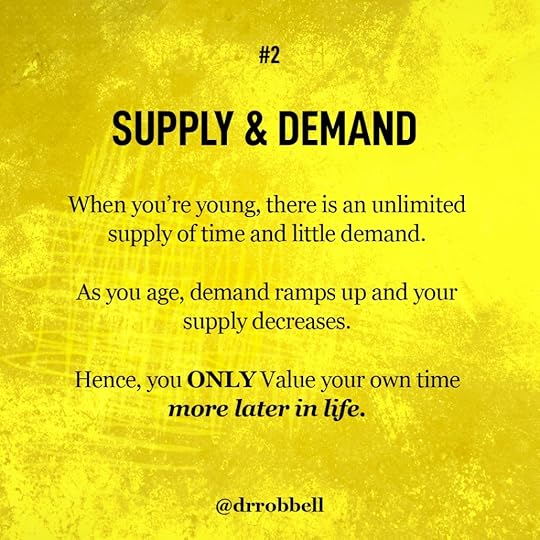 #2- Supply & Demand
#2- Supply & Demand
When you’re young, there is an unlimited supply of time and little demand.
As you age, demand ramps up and your supply decreases.
Hence, you ONLY value your own time more later in life.
The older we get, the more we appreciate the power and importance of time and patience.
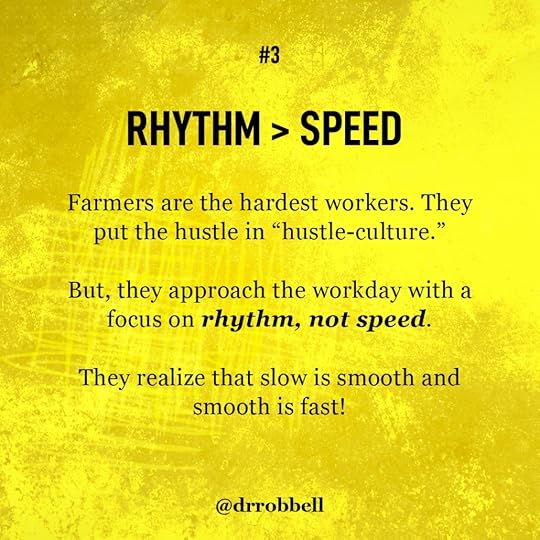 #3- Rhythm > Speed
#3- Rhythm > Speed
Farmers are the hardest workers. They put the hustle in “hustle-culture.”
But, they approach the workday with a focus on rhythm, not speed.
They realize that slow is smooth and smooth is fast!
That’s why patience is the New Mental Toughness and how it helps reveal the importance of patience.
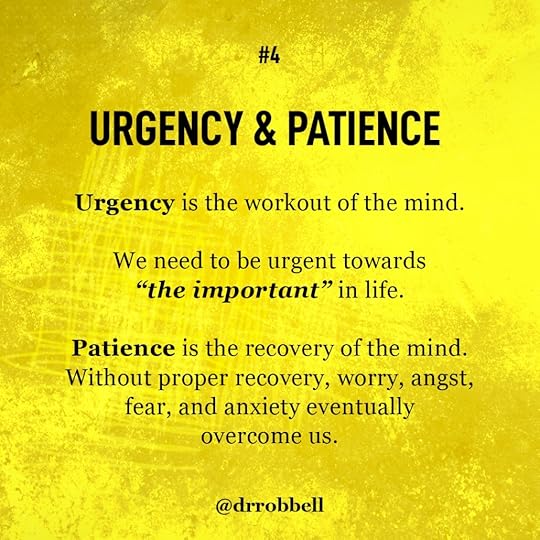 #4- Urgency & Patience
#4- Urgency & Patience
Urgency is the workout of the mind.
We need to be urgent towards “the important” in life.
However, the issue is that we become URGENT about everything! We’re urgent about any type of waiting in our daily lives.
Patience is the recovery of the mind.
Without proper recovery, worry, angst, fear, and anxiety eventually overcome us.
 #5- Process > Product
#5- Process > Product
The process takes perspective!
It takes an intentional effort to stay focused.
The product takes patience!
Farmers simply know that the day the seed is planted is not the day it’s harvested.
And since patience is the new mental toughness, it reflects the importance of time and patience.
The main principle behind wealth and success is patience.
Warren Buffet said it best, when asked why everyone doesn’t adopt his simple investment strategy. He said, “because no one wants to get rich slow.”
Compounding with money merely reflects the importance of time and patience. Compounding is patience in action.
 Dr. Rob Bell is a Sport Psychology Coach. DRB & associates coach executives and professional athletes. Some clients have included three different winners on the PGA Tour, Indy Eleven, University of Notre Dame, Marriott, and Walgreens.
Dr. Rob Bell is a Sport Psychology Coach. DRB & associates coach executives and professional athletes. Some clients have included three different winners on the PGA Tour, Indy Eleven, University of Notre Dame, Marriott, and Walgreens.
Check Out All The Books
Keynote Speaking On Mental Toughness
Mental Toughness Podcast as we interview expert athletes and coaches about Mental Strength and their Hinge Moment.
New Mental Wellness Blog Posts are published weekly.
Follow on Twitter @drrobbell
Follow on Instagram @drrobbell
January 22, 2024
The 4 Best Mental Tips For Building Patience Skills

Patience is the new mental toughness and will remain the last barrier on the hierarchy for anyone wanting to reach their full potential with confidence and focus.
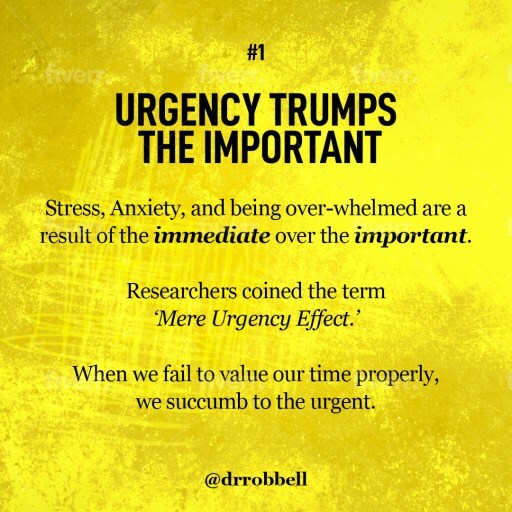
Stress, anxiety, and being over-whelmed are a result of the immediate over the important.
Researchers coined the term ‘Mere Urgency Effect.’
When we fail to value our time properly, we succumb to the urgent.
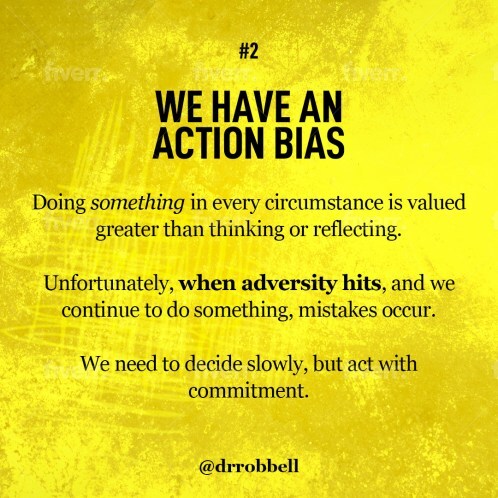
2- We Have An Action Bias
Doing something in every circumstance is valued greater than thinking or reflecting.
Unfortunately, when adversity hits, and we continue to do something, mistakes occur.
We need to decide slowly, but act with commitment. Patience is why D-Day in WWII was so successful.
Check Out The Mental Toughness Book I Can’t Wait To Be Patient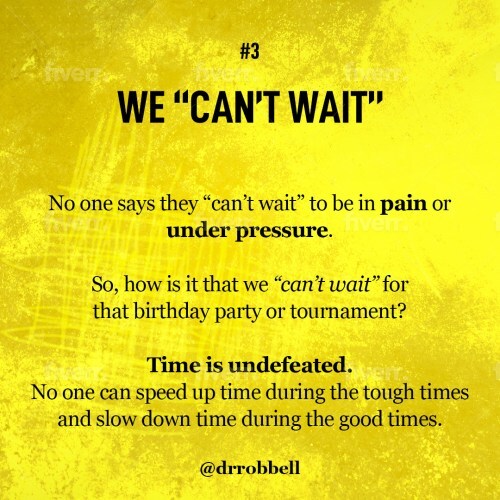 3- We “Can’t Wait”
3- We “Can’t Wait”No one says they “can’t wait” to be in pain or under pressure.
So, how is it that we “can’t wait” for that birthday party, conference, or tournament?
Time is undefeated.
No one can speed up time during the tough times and slow down time during the good times.
[Tweet “So, how is it that we “can’t wait” for that birthday party, conference, or tournament?”]
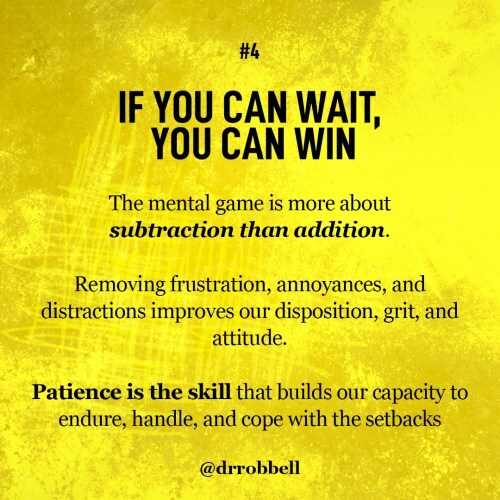 4- If You Can Wait, Then You Can Win
4- If You Can Wait, Then You Can WinThe mental game is more about subtraction than addition.
Removing frustration, annoyances, and distractions improves our disposition, grit, and attitude.
The 4 Best Mental Tips For Building Patience skills improves our capacity to endure, handle, and cope with the setbacks.
Time is our most precious resource. make sure we are using it wisely and it’ll help our overall mental game!
 Dr. Rob Bell is a Sport Psychology Coach. DRB & associates coach executives and professional athletes. Some clients have included three different winners on the PGA Tour, Indy Eleven, University of Notre Dame, Marriott, and Walgreens.
Dr. Rob Bell is a Sport Psychology Coach. DRB & associates coach executives and professional athletes. Some clients have included three different winners on the PGA Tour, Indy Eleven, University of Notre Dame, Marriott, and Walgreens.
Check Out All The Books
Keynote Speaking On Mental Toughness
Mental Toughness Podcast as we interview expert athletes and coaches about Mental Strength and their Hinge Moment.
New Blog Posts are published weekly.
Follow on Twitter @drrobbell
Follow on Instagram @drrobbell
The 4 Best Mental Tips For Building Patience Skills | |

Here Are The 4 Best Mental Tips for Building Patience Skills for sports, work, family, and life.
Patience is the new mental toughness and will remain the last barrier on the hierarchy for anyone wanting to reach their full potential with confidence and focus.
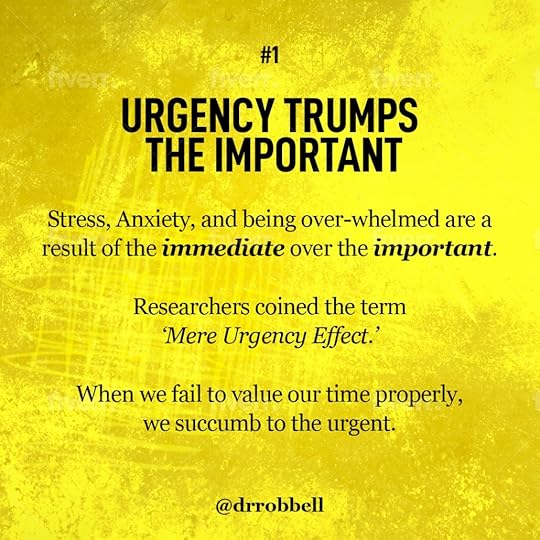
1- Urgency trumps the important
Stress, anxiety, and being over-whelmed are a result of the immediate over the important.
Researchers coined the term ‘Mere Urgency Effect.’
When we fail to value our time properly, we succumb to the urgent.
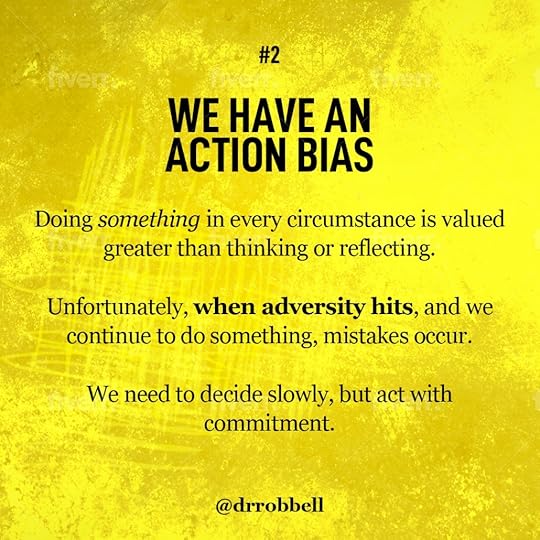
2- We Have An Action Bias
Doing something in every circumstance is valued greater than thinking or reflecting.
Unfortunately, when adversity hits, and we continue to do something, mistakes occur.
We need to decide slowly, but act with commitment. Patience is why D-Day in WWII was so successful.
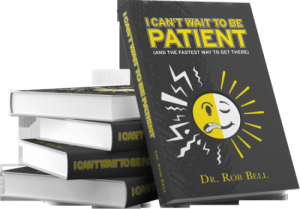
Check Out The Mental Toughness Book
I Can't Wait To Be Patient
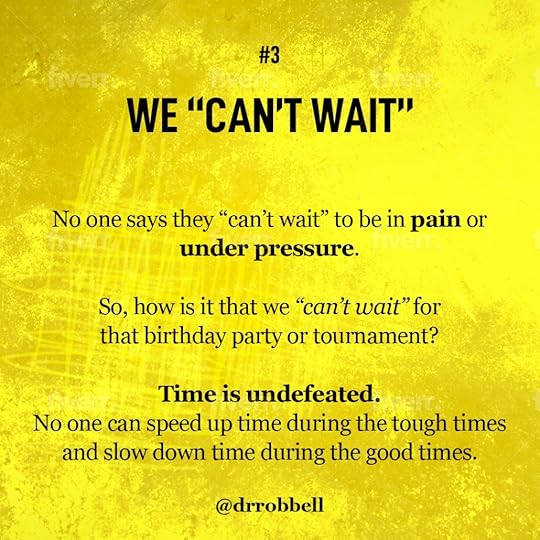
3- We “Can’t Wait”
No one says they “can’t wait” to be in pain or under pressure.
So, how is it that we “can’t wait” for that birthday party, conference, or tournament?
Time is undefeated.
No one can speed up time during the tough times and slow down time during the good times.
So, how is it that we “can’t wait” for that birthday party, conference, or tournament?
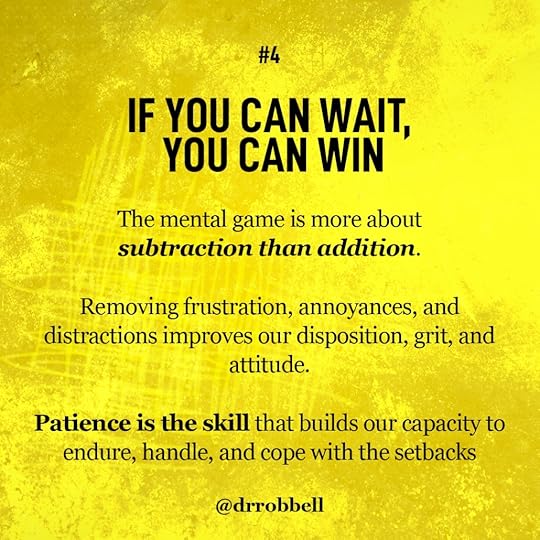
4- If You Can Wait, Then You Can Win
The mental game is more about subtraction than addition.
Removing frustration, annoyances, and distractions improves our disposition, grit, and attitude.
The 4 Best Mental Tips For Building Patience skills improves our capacity to endure, handle, and cope with the setbacks.
Time is our most precious resource. make sure we are using it wisely and it'll help our overall mental game!
 Dr. Rob Bell is a Sport Psychology Coach. DRB & associates coach executives and professional athletes. Some clients have included three different winners on the PGA Tour, Indy Eleven, University of Notre Dame, Marriott, and Walgreens.
Dr. Rob Bell is a Sport Psychology Coach. DRB & associates coach executives and professional athletes. Some clients have included three different winners on the PGA Tour, Indy Eleven, University of Notre Dame, Marriott, and Walgreens.
Check Out All The Books
Keynote Speaking On Mental Toughness
Mental Toughness Podcast as we interview expert athletes and coaches about Mental Strength and their Hinge Moment.
New Mental Wellness Blog Posts are published weekly.
Follow on Twitter @drrobbell
Follow on Instagram @drrobbell
The post The 4 Best Mental Tips For Building Patience Skills | | appeared first on Mental Toughness Coach | Dr. Rob Bell - Speaker & Author.
4 Mental Tips For Building Patience Skills

Patience is the new mental toughness and will remain the last barrier on the hierarchy for anyone wanting to reach their full potential with confidence and focus.
Here are 4 tips for building patience skills for sports, work, family, and life.

1- Urgency trumps the important
Stress, anxiety, and being over-whelmed are a result of the immediate over the important.
Researchers coined the term ‘Mere Urgency Effect.’
When we fail to value our time properly, we succumb to the urgent.

2- We Have An Action Bias
Doing something in every circumstance is valued greater than thinking or reflecting.
Unfortunately, when adversity hits, and we continue to do something, mistakes occur.
We need to decide slowly, but act with commitment. Patience is why D-Day in WWII was so successful.
Check Out The Book I Can’t Wait To Be Patient
 3- We “Can’t Wait”
3- We “Can’t Wait”No one says they “can’t wait” to be in pain or under pressure.
So, how is it that we “can’t wait” for that birthday party, conference, or tournament?
Time is undefeated.
No one can speed up time during the tough times and slow down time during the good times.
So, how is it that we “can’t wait” for that birthday party, conference, or tournament?
 4- If You Can Wait, Then You Can Win
4- If You Can Wait, Then You Can WinThe mental game is more about subtraction than addition.
Removing frustration, annoyances, and distractions improves our disposition, grit, and attitude.
Building Patience skills improves our capacity to endure, handle, and cope with the setbacks.
 Dr. Rob Bell is a Sport Psychology Coach. DRB & associates coach executives and professional athletes. Some clients have included three different winners on the PGA Tour, Indy Eleven, University of Notre Dame, Marriott, and Walgreens.
Dr. Rob Bell is a Sport Psychology Coach. DRB & associates coach executives and professional athletes. Some clients have included three different winners on the PGA Tour, Indy Eleven, University of Notre Dame, Marriott, and Walgreens.
Check Out All The Books
Keynote Speaking On Mental Toughness
Mental Toughness Podcast as we interview expert athletes and coaches about Mental Strength and their Hinge Moment.
New Blog Posts are published weekly.
Follow on Twitter @drrobbell
Follow on Instagram @drrobbell
December 9, 2023
Confidence and Focus: An Unbeatable Pair For Your Mental Toughness
Confidence is King, but Focus is Queen.
The game of chess is NOT won by moving the king one space at a time. The King is just how the game is lost!
Chess is won by utilizing the Queen!
Within the hierarchy of mental toughness, we all know the importance of confidence. And yes, there are specific ways to build and enhance one’s confidence, but there is even a better approach to victory than just trying to address the area of confidence.
In the classic book by Sun Tzu, The Art of War, it was proposed that the strongest way to beat an opponent in battle is by flanking your opponent. Historical and modern warfare examples support that claim. Flanking your opponent means attacking from the side instead of the front which is where most of the strength of resistance resides.
I was always shocked that in the Civil War, most of the battles seemed to play out as columns of soldiers simply walking and shooting straight at one another. The greatest blunder in the Civil War was the result of a frontal assault in Pickett’s charge. Whereas the greatest victories were claimed by flanking the opponents side.
Our greatest opponent is our own mind.
Our mind has one role which is to protect itself and it does a masterful job. However trying to ONLY work on being confident is like a frontal assault in battle. Instead, we need to flank our own mind in order to build Confidence and Focus.
Within the hierarchy of mental toughness, these two infographics reveal three ways that we build your mental toughness. The mental game is simple, but not easy. Hence, after you check out these visuals, be sure top let us know which skill is harder for you to accomplish?

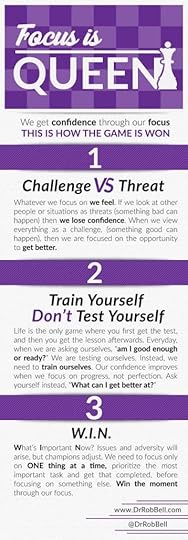
 Dr. Rob Bell is a Sport Psychology Coach. DRB & associates coach executives and professional athletes. Some clients have included three different winners on the PGA Tour, Indy Eleven, University of Notre Dame, Marriott, and Walgreens.
Dr. Rob Bell is a Sport Psychology Coach. DRB & associates coach executives and professional athletes. Some clients have included three different winners on the PGA Tour, Indy Eleven, University of Notre Dame, Marriott, and Walgreens.
Check Out All The Books
Keynote Speaking On Mental Toughness
Mental Toughness Podcast as we interview expert athletes and coaches about Mental Strength and their Hinge Moment.
New Blog Posts are published weekly.
Follow on Twitter @drrobbell
Follow on Instagram @drrobbell
October 22, 2023
The 4 Scientific Ways To Build Confidence
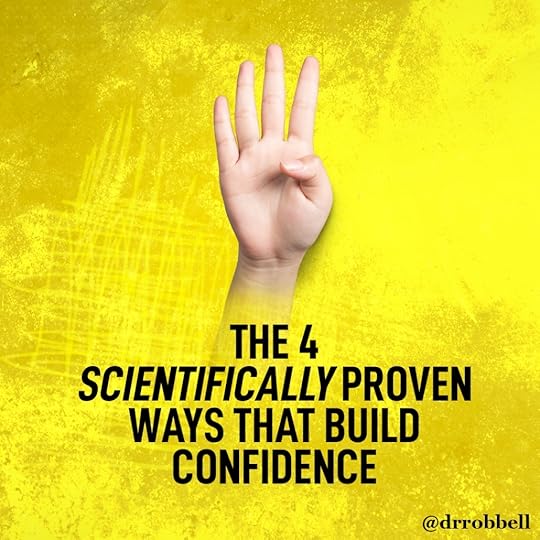
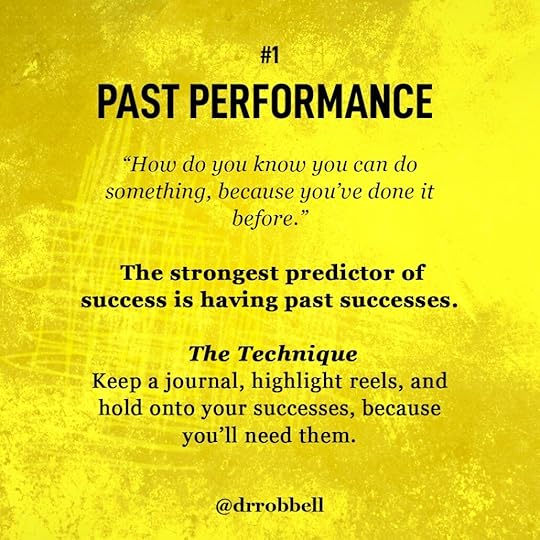
1.Past Performance- This is the strongest predictor of confidence.
Thus, how can we be confident if we haven’t achieved it yet?
In order to achieve big things and have successes, we will reach a point where we haven’t accomplished our goal, yet. We always fall back to the level of training and our own past performances. These proven ways are simple, but they are not easy.
So, we must hold onto and reinforce our successes along the way, no matter how small or insignificant it may be at the time. This is the strongest of the proven ways to build confidence.
Confidence is contagious and this is the strongest of the ways to build our confidence muscle.
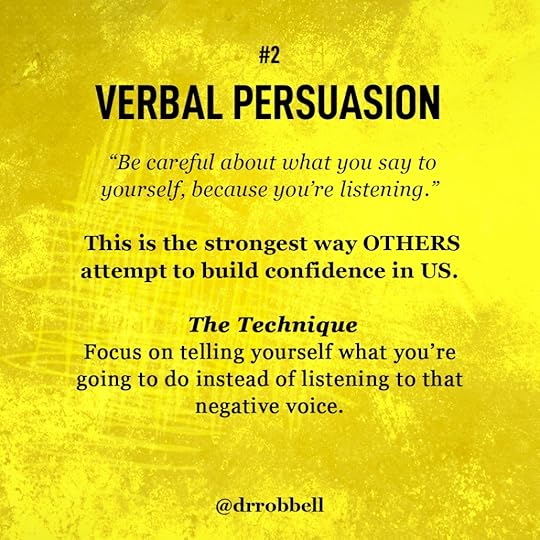 2. Verbal Persuasion- We have to be so careful about what we say to ourselves because we are listening.
2. Verbal Persuasion- We have to be so careful about what we say to ourselves because we are listening.
This is the most common ways that OTHERS try and build confidence and belief in us. Telling us and reminding us what we can accomplish and who we are.
The struggle is that although we can hear it from others, it’s what we say to ourselves that makes the biggest impact on our own self-worth.
If we discount or dismiss our coaches or boss’ belief in us, then we’ll never escape the negative self-talk cycle.
These ways to build confidence are coupled with focus and our self-talk.
 3. Modeling- They can do it, so that means I can do it.
3. Modeling- They can do it, so that means I can do it.
We need others to have success around us, because it shows that we can also do it.
The famous quote by JFK “A rising tide lifts all ships” is akin to making sure others have success. That’s why I believe that true success is rooting for everybody.
In any organization or team, there needs to be a model or example of someone who people can point to and look at and say “here, do it like this.”
Remember Mone’ Davis? She was the awesome softball player in the Little League World Series. The sheer number of girls who saw her compete immensely increased the amount of girls who started playing? WHY? Girls, particularly of color, saw her and said “she can do it, so can I, She’s just like me!” When we see others have success, it shows us that we can have success as well.
Hence, it’s why we need to focus on the similarities, not differences, between us.
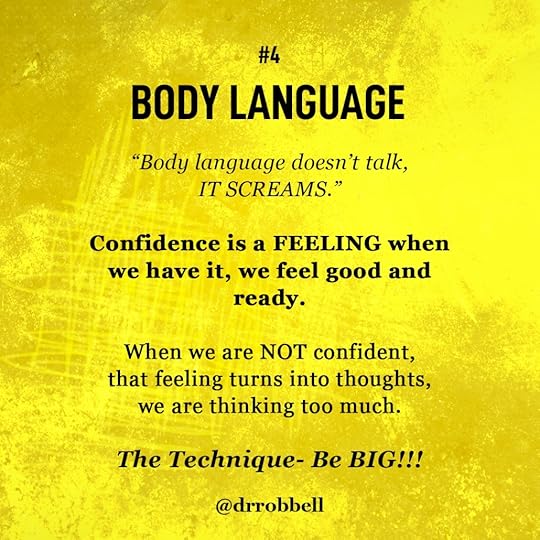 4. Body Language- This is the reason why confidence is just a feeling.
4. Body Language- This is the reason why confidence is just a feeling.
These proven ways to build confidence in sports or business are not just pithy sayings. They are based in science.
Confidence is a feeling when we have it.
To prove it, What do you think about when you perform your best? The answer is always the same, NOTHING…
Confidence is a feeling…. After a tough workout session, you FEEL better, but even though you think you look better, you look no different than before.
Confidence is a feeling….The opposite is true, when we lose confidence, it turns into thoughts… It doesn’t mean the thoughts are even negative, it just means that we are thinking too much…
These are the 4 proven ways that build confidence.
Life is tough. Sports is tough. Business is tough. If you lose belief in yourself, then you’re in trouble! Focus on these strategies!
 Dr. Rob Bell is a Sport Psychology Coach. DRB & associates coach executives and professional athletes. Some clients have included three different winners on the PGA Tour, Indy Eleven, University of Notre Dame, Marriott, and Walgreens.
Dr. Rob Bell is a Sport Psychology Coach. DRB & associates coach executives and professional athletes. Some clients have included three different winners on the PGA Tour, Indy Eleven, University of Notre Dame, Marriott, and Walgreens.
Check Out All The Books
Keynote Speaking On Mental Toughness
Mental Toughness Podcast as we interview expert athletes and coaches about Mental Strength and their Hinge Moment.
New Blog Posts are published weekly.
Follow on Twitter @drrobbell
Follow on Instagram @drrobbell
October 9, 2023
The Importance of Patience Saves Patients
Researchers examined death rates of heart attack hospitalizations between the years of 2002-2011 when the top doctors attended national conferences.
The researchers examined the mortality rates of patients who were admitted to the emergency room with a heart attack. They observed patients for thirty-days after admission.
One would logically hope that the top doctors be available and on-call if a loved one were admitted to the hospital for such a high-risk situation.
The results were contrary to our assumptions of top health care (Well, at least mine).
The mortality rate of high-risk patients was 17% when the doctors were away at a national conference, compared to 24.8% of deaths that occurred with the non-conference dates.
The mortality rate of high-risk patients was 17% when the doctors were away at a national conference, compared to 24.8% of deaths that occurred with the non-conference dates.
Click To Tweet
The importance of patience revealed that patients admitted to the hospital were more likely to survive a heart attack during cardiology national conference dates.
To help explain decreased mortality rates, the authors of the study offered the “less is more” approach Doing “nothing” resulted in more lives being saved than performing surgery.
On-call cardiologists were reluctant to perform interventions based on a risk-benefit tradeoff. The potential harms of invasive interventions and procedures simply outweighed the benefits. At risk of potential harm of invasive treatment, cardiologists on-call sided with avoiding surgery. And it resulted in more lives being saved.
There was a reduction in specific procedures within the hospitals for these high-risk patients.
Researchers discovered that one of the main barriers for physicians was uncertainty and disagreement about what “not” to do. There exist specific guidelines and routines at the national, regional, and local level of care, which often sadly contradict one another.

Medical doctors do not frequently participate in strikes.
There are ethical concerns and criticism due to strikes adversely affecting patients’ health. So, when they occur, just like other essential service industries, panic and fear can result.
Five notable physicians’ strikes have occurred between the years of 1976 and 2003. These strikes lasted between nine days and seventeen weeks.
However, in every case of physicians’ strikes, the mortality rate stayed the same or decreased, but it never increased.
For instance, during 1976, doctors in Columbia went on strike for fifty-two days, and mortality rates dropped by 35% during that time.When doctors in Los Angeles went on strike over working conditions and wages, mortality rate dropped 18%.
In 2000, Israeli doctors went on strike. The strike resulted in hundreds of thousands of outpatient visits being canceled along with thousands of elective procedures.
The Jerusalem Post surveyed the non-profit burial society, which performs over 55% of burial services in Jerusalem. During the strike, the number of funerals performed in the region dropped significantly compared to data from the previous three years.
These results align exactly with the studies of top cardiologists attending conferences. The importance of patience saves lives. Even in health care, there exists an action bias and an inability to wait.
Researchers have even cited that “Physicians are wrong when they tell terminally ill patients ‘doing something’ (in other words, pursuing treatment) is better than doing nothing” (“nothing” usually meaning choosing hospice care instead of treatment).
Clinical uncertainty is a balancing act. And the importance of patience has given way to an action bias that results in doing something.
Doctors have reported a need to do something in order to soothe the emotions of patients. For instance, the global medical community has prompted initiatives to reduce the number of antibiotics prescribed. Nonetheless, research has repeatedly shown that clinicians prefer to “err on the side of caution” and provide the patient antibiotics just to be safe.
Ordering a test, intervention, or medicine is a way of doing something rather than nothing and waiting. These actions supposedly assures patients that everything will be all right.
Doing something occurs way more often than waiting and re-evaluating the symptoms. And whereas, these procedures won’t causes death, it reveals that there exists an action bias, which is the same for top doctors and cardiologists.
However, perhaps, if we can wait, then we can live.
 Dr. Rob Bell is a Sport Psychology Coach. DRB & associates coach executives and professional athletes. Some clients have included three different winners on the PGA Tour, Indy Eleven, University of Notre Dame, Marriott, and Walgreens.
Dr. Rob Bell is a Sport Psychology Coach. DRB & associates coach executives and professional athletes. Some clients have included three different winners on the PGA Tour, Indy Eleven, University of Notre Dame, Marriott, and Walgreens.
Check Out All The Books
Keynote Speaking On Mental Toughness
Mental Toughness Podcast as we interview expert athletes and coaches about Mental Strength and their Hinge Moment.
New Blog Posts are published weekly.
Follow on Twitter @drrobbell
Follow on Instagram @drrobbell
August 9, 2023
The Consequences of Labeling A Child Athlete |
The Consequences of Labeling A Child Athlete
A study was conducted that looked at individuals’ names and the careers that they picked later in life, and the results were remarkable.
The study revealed that the number one name for Dentists was Dennis.
Now it doesn’t mean that every dentist out there is named Dennis, but merely that the names that we are called and associate with are what we gravitate towards later in life.
The Ultimate Sport Parents Guide: How To Have a Great Athlete
There was this one athlete, and the parents introduced her as “Perfect little Rachel.”
And I’m wondering in my head how long have they been calling her that?
Because perfection is a pretty high standard.
“Hey, here comes Johnny, our Star Second baseman.” Whatever we are called is what we’re gonna associate with and that’s the natural consequences of labeling a child athlete. What happens with Johnny when he’s no longer the “Star Second Baseman”, or Rachel is no longer “perfect”?
Whatever we want them to associate with is what we’ve got to call our athletes.
Sport Parents: 6 Ways Your Doing It Wrong
Here’s what we need to label them….
Call your athletes competitors!
Why? Because we can compete in anything in life.
The best type of mental toughness competition is always against ourselves.
Is not always about beating somebody else, but we can compete in being a friend. We can compete in being a good neighbor, being a great teammate, doing well on a test.
And we can always compete.
10 Reminders if you’re a stressed out parent of an athleteAnd the more that we compete with ourselves, the better that we get. So we don’t need to put pressure on individuals by calling them certain names like Perfect or this is our star goalie, call them a competitor. There’s your mental toughness tip of the day, knowing the natural consequences of labeling a child athlete.
Then watch, because that’s what they will become.

 Dr. Rob Bell is a Sport Psychology Coach. DRB & associates coach executives and professional athletes. Some clients have included three different winners on the PGA Tour, Indy Eleven, University of Notre Dame, Marriott, and Walgreens.
Dr. Rob Bell is a Sport Psychology Coach. DRB & associates coach executives and professional athletes. Some clients have included three different winners on the PGA Tour, Indy Eleven, University of Notre Dame, Marriott, and Walgreens.
Check Out All The Books
Keynote Speaking On Mental Toughness
Mental Toughness Podcast as we interview expert athletes and coaches about Mental Strength and their Hinge Moment.
New Blog Posts are published weekly.
Follow on Twitter @drrobbell
Follow on Instagram @drrobbell

